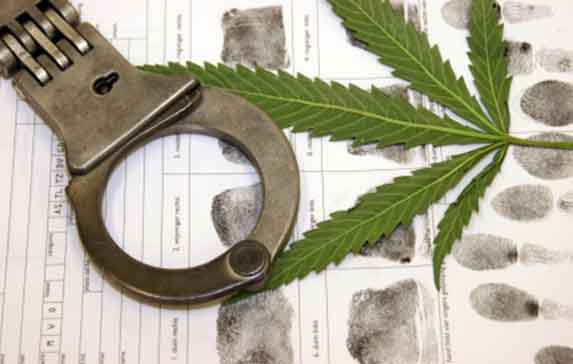Racism in Drug Arrests: Blacks, Four Times More Likely to Go to Jail
There may be little or no difference between the amount of pot white and black people smoke, but there’s surely a huge gap between black/white drug arrests. According to a detailed report by the American Civil Liberties Union, black Americans are four times more likely to get arrested for drug use and possession. The data, collected from all 50 states and the District of Colombia, provides an accurate depiction of drug law enforcement by race and state.
It turns out 14 percent of black people and 12 percent of white people have reported in 2010 they have used marijuana at least once in the previous year. The report shows a greater number of arrests for whites – 460,808 – than blacks, with only 282,117 arrests, but the numbers translate in 716/100,000 for blacks versus only 192/100,000 for whites. In Minnesota, Illinois and Washington D.C., black Americans were up to 8.5 times more likely than whites to be put behind bars for marijuana possession.
Some theories claim that the reason why blacks are more likely to get arrested is because it’s easier for the police to intervene and bust people in the “open air” drug markets currently found in black communities, as opposed to searching through the basements and country clubs of white communities. Furthermore, the increased likelihood of black defendants to insult police officers and be rebellious increases the chances ofarrest.
Decriminalization to Save Money
 The financial burden of drug arrests on the U.S. economy is tremendous. Economists believe the government could save more than $13 billion on prohibition enforcement costs by decriminalizing marijuana use and almost $1 billion/year in incarceration costs for marijuana-related charges. On the other hand, legal marijuana could be an industry with a value of $45 to $100 billion, according to a recent Bloomberg report, while each hydroponic marijuana growing store could provide at least 75 jobs indirectly.
The financial burden of drug arrests on the U.S. economy is tremendous. Economists believe the government could save more than $13 billion on prohibition enforcement costs by decriminalizing marijuana use and almost $1 billion/year in incarceration costs for marijuana-related charges. On the other hand, legal marijuana could be an industry with a value of $45 to $100 billion, according to a recent Bloomberg report, while each hydroponic marijuana growing store could provide at least 75 jobs indirectly.
The sad part is; the huge costs are in most part supported by taxpayers. According to Forbes.com, marijuana prohibition costs tax-payers a staggering $41.8 billion per year, as the value of the market for illegal marijuana exceeded $36 billion in the U.S. only.
Decriminalization to End Racism
The solution to the disparities between white and black arrests is somewhat evident: decriminalization of marijuana will eventually reduce the overall arrest rates. In 2009, the state of Massachusetts decriminalized the possession of small amounts of marijuana,and since then has seen a significant reduction in the number of arrests, from 9,000 to almost 1,200. It even caused the black/white arrest gap to narrow, from 5.4 to 3.41, and there’s no reason to think that legalization would not be effective in erasing such disparities.
Clearly, legalization would not only put an end to the wasteful spending of law enforcement resources, but according to almost half of Americans surveyed in recent polls, it would also boost the economy, since the millions that are now going to drug cartels could be redirected to state budgets by taxing and regulating marijuana similar to alcohol.
The end of marijuana prohibition would also restore the image of black drug users, considered criminals or debased human beings,and abolish the discriminatory policies that reinforce social and ethnic discrepancies. With the help of a criminal defense lawyer, individualscan reduce the impact criminal charges have on their professional and social lives, granting them the same access as before towell-paid jobs, housing or child custody.
About the Author:
Andrew M. Weisberg is a criminal defense attorney in Chicago, Illinois. A former prosecutor in Cook County, Mr. Weisberg,is a member of the Capital Litigation Trial Bar, an elite group of criminal attorneys who are certified by the Illinois Supreme Court to try death penalty cases. He is also a member of the Federal Trial Bar. Mr. Weisberg is a sole practitioner at the Law Offices of Andrew M. Weisberg.







 Blog Home
Blog Home 










